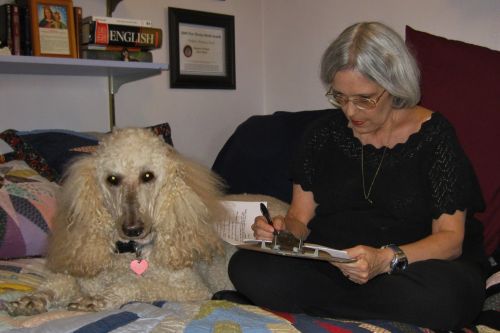It shouldn't be. Writers are, first and foremost, readers. It's the best place to learn the craft of writing.
What I love about reading is the characters I meet... even more than the stories about those characters. I see the characters as people that I meet. It doesn't really matter to me what the people I meet do or what happens to them--I'm interested in the person, the character.
Let me clarify. My favorite book of all time is "A Tree Grows in Brooklyn" by Betty Smith. It tells the story of Francie Nolan, a poor girl living in Brooklyn in 1912. Nothing much really happens to Francie, if we're going to compare her life to that of, say, Ian Fleming's James Bond, or J.R.R. Tolkien's Frodo. But Francie is interesting to me because she is a girl who has dreams, who has pride, who has a fierce determination to get ahead. These are characteristics that appeal to me in a person, one who does not let the events in life define who she is, though they might affect her actions and reactions.
I have read many books, mostly in the mystery genre, but there are certain characters that stick in my mind. What makes them interesting, to me, is that there is nothing "extraordinary" about them... they are fairly average people, going about their daily business (be it police officer, nun, or even reclusive heiress!) who find themselves in the middle of a problem that may, or may not, be any of their business, but they begin working to solve it, whether enthusiastically or half-heartedly. Things may happen to them, but they don't just sit back and wait to see how it all pans out; they dive in head-first and join in the action!
I've read many books which I've been asked to review for other authors. Sometimes I don't actually write the review (or even finish the book!) because, quite frankly, the characters bore me! Nothing is worse than a character who just sits there and lets things happen and simply comments on them. None of the events in the book, whether directly affecting the character or not, evoke any kind of action or change on the character. In short, the characters seem more like news reporters and you begin to wonder why they are in the story to begin with!
A good character, regardless of the genre of the story, makes you care about them or identify with them. A good character evokes some kind of feeling (sometimes good, sometimes bad) and is not just a part of the scenery. A good character will leave you wondering what happened to them after the author has written "The End" and, if it's a series, leave you with eager anticipation for the next book, when you can visit that character once again and catch up on all that's been going on since you last got together.
Just like the people in our lives whom we care about, regardless of how exciting (or not) their life is at any given moment, good characters are the ones whom you are happy to encounter and leave an impression.
And now, back to the characters in Bonney County....






